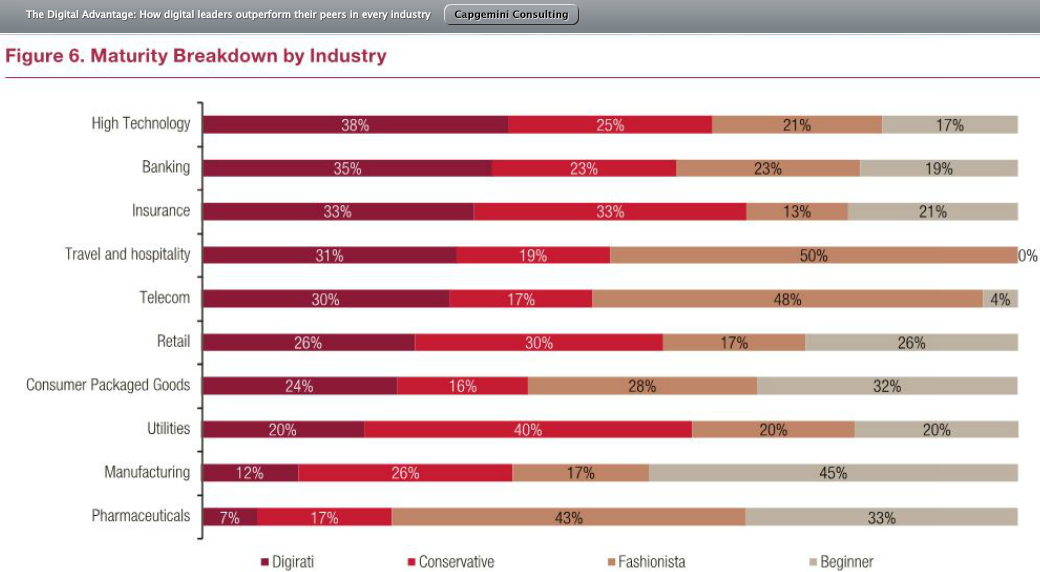According to research by Capgemini Consulting and the MIT Center for Digital Business, there really is such a thing as a “digital advantage,” and companies that have it experience significantly better financial performance than less digitally capable companies.
The research included over 400 companies around the world from Europe, the United States, Latin America, Asia Pacific, The Middle East, and Africa. A variety of industries were also researched, including technology, banking, insurance, telecoms, consumer packaged goods, utilities, retail, manufacturing, pharmaceuticals, and travel and hospitality. Across every industry, digitally mature companies were more profitable. As reported by Business Insider, overall, digitally mature companies were found to be on average 26% more profitable than their peers, to achieve a 12% higher market capitalization, and to derive 9% more revenue from current assets.
Digitally mature companies don’t just focus on technology. Instead, these companies strategically invest in digital technology and align the company’s future with digital initiatives. In other words, it’s a top-down focus that puts technology in a far more influential position than it is typically viewed (i.e., a cost center).
Companies were found to fall into one of four digital maturity categories:
- Beginners: These companies are just getting started in the digital arena.
- Fashionistas: These companies pursue digital initiatives because they’re new, cool, or trendy. However, they lack strategic focus and digital is not aligned with business goals.
- Conservatives: These companies understand that digital is important and have a strategy in place, but they aren’t making the necessary monetary investments in technology and digital capabilities to reach digital maturity.
- Digirati: These companies are leading the way and have invested in digital strategic planning, top-down buy-in, technology, and more to make digital a core component of the business.
Companies in specific industries tend to fall into specific digital maturity categories. For example, pharmaceutical companies, manufacturing companies, and consumer packaged goods companies primarily landed in the Beginner category while telecom and travel and hospitality companies were in the Fashionistas category. More mature industries that landed in the Conservatives category were insurance and utilities while the most digitally advanced industries were found to be banking, retail, and high tech. You can see the digital maturity breakdown by industry from the Capgemini Consulting report below.
Click the image to view the image at the source where you can zoom in.
The report authors explain that, “No firm is immune from digital transformation,” because it offers significant opportunities for increased efficiency and productivity as well as increased profits, market capitalization, and revenues from current assets. However, they also warn that digital transformation must be led from the top to be successful, and a cohesive relationship between business and IT is critical to ensure the company has a chance to become digitally mature.
You can read the full report here. You can also watch a video presentation or download the report on the Capgemini Consulting website.
Susan Gunelius is the author of 10 marketing, social media, branding, copywriting, and technology books, and she is President & CEO of KeySplash Creative, Inc., a marketing communications company. She also owns Women on Business, an award-wining blog for business women. She is a featured columnist for Entrepreneur.com and Forbes.com, and her marketing-related articles have appeared on websites such as MSNBC.com, BusinessWeek.com, TodayShow.com, and more.
She has over 20 years of experience in the marketing field having spent the first decade of her career directing marketing programs for some of the largest companies in the world, including divisions of AT&T and HSBC. Today, her clients include large and small companies around the world and household brands like Citigroup, Cox Communications, Intuit, and more. Susan is frequently interviewed about marketing and branding by television, radio, print, and online media organizations, and she speaks about these topics at events around the world. You can connect with her on Twitter, Facebook, LinkedIn, or Google+.



